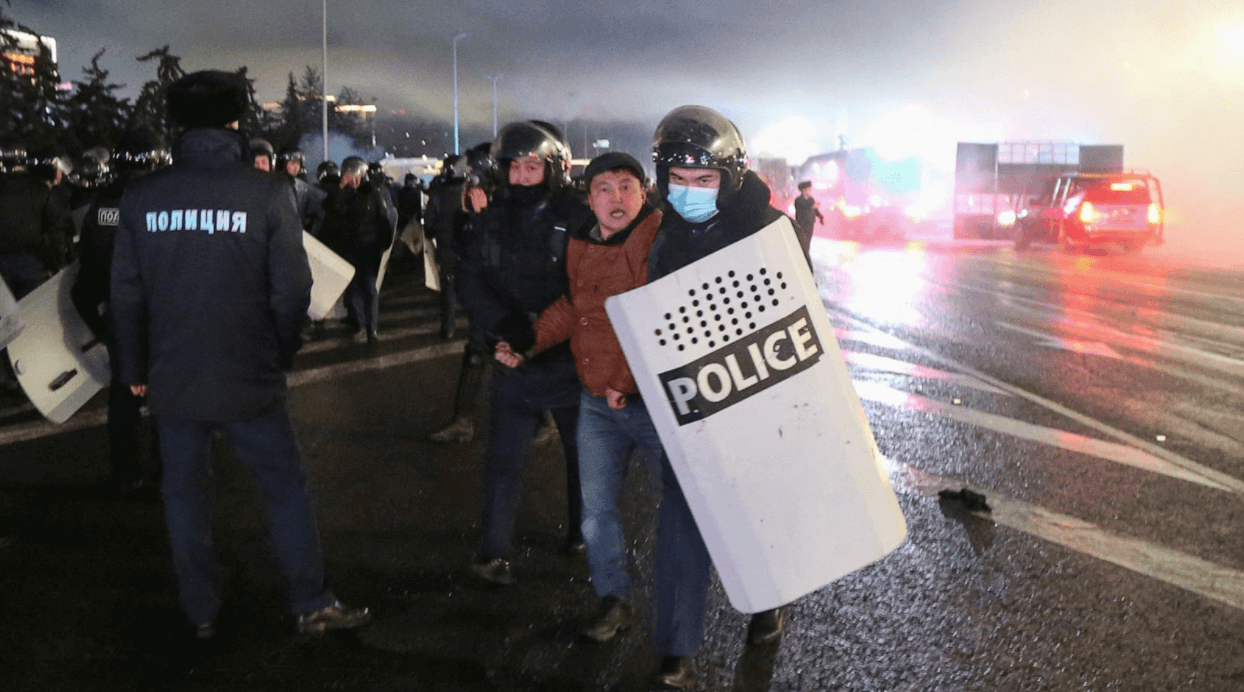
Legal report prepared by: Human Rights Foundation
Publication date: July 31, 2013
In December 2012, the government of Kazakhstan banned all publications, broadcasts, and dissemination of information by the newspapers Respublika and Vzglyad, and TV stations K-plyus and Stan TV, along with all associated websites. This media crackdown was based on their critical coverage of a labor strike that took place one year earlier in the Kazakhstani town of Zhanaozen, where, on December 16, 2011, in a violent clash between police and striking oil workers, police killed at least 15 protestors and 100 people were injured.
In the last few years, Kazakhstan has systematically restricted the right to freedom of expression within its territory. Under the more than two-decade long rule of President Nursultan Nazarbayev, the country has endured serious irregularities in its electoral processes, as well as the harassment and prosecution of opposition leaders, human rights defenders, journalists, and media outlets. Following the events of Zhanaozen, the government of Kazakhstan has used all critical speech made during the strike as grounds for prosecution of political opposition figures and the independent media.
The court decisions that banned K-plyus, Stan TV, Respublika, and Vzglyad were based on a prior ruling on the case of Vladimir Kozlov, a Kazakhstani opposition leader who was wrongfully prosecuted and convicted in connection to the events in Zhanaozen. The criminal charges filed against these mass media outlets included, among others: extremism in the form of incitement to social discord and propaganda of violent government take-over (Article 1(5) of the Law on Countermeasures against Extremism); breach of the prohibition for activities aimed at incitement to social discord in the form of national threats, as well as the distribution of materials undermining national security (Article 5(6) and Article 22(5)(2) of the Law on National Security); and breach of the prohibition for all propaganda and activism promoting the violent change of the constitutional systems, as well as propaganda of social, national, class, or tribal superiority, and any actions capable of upsetting inter-ethnic peace (Article 20(3) and Article 39(2) of the Constitution of the Republic of Kazakhstan).
According to international human rights law, the right to freedom of expression protects all forms of expression and the means of their dissemination. This right includes the expression and receipt of communications of every form of idea and opinion capable of transmission to others, including political discourse, commentary on one’s own and public affairs, canvassing, discussion of human rights, journalism, cultural and artistic expression, teaching, and religious discourse. Means of expression include books, newspapers, pamphlets, posters, banners, dress, and legal submissions. They also include all forms of audio-visual, electronic, and internet-based modes of expression.
Under Article 20(2) of the International Covenant on Civil and Political Rights (ICCPR), “any advocacy of national, racial or religious hatred that constitutes incitement to discrimination, hostility or violence shall be prohibited by law” (incitement prohibition). Under the ICCPR, government measures implementing the Article 20 incitement prohibition require a high threshold because, as a matter of fundamental principle, limitation of speech must always remain an exception. Such a threshold must be read in consonance with the Article 19(3) three-prong test for restrictions—namely, such restrictions must be provided by law, be narrowly defined to serve a legitimate interest, and be necessary in a democratic society to protect that interest.
The court decisions banning all publications, broadcasts, and dissemination of information by the newspapers Respublika and Vzglyad and TV stations K-plyus and Stan TV (along with all associated websites) as the speech-restrictive measure adopted by the State of Kazakhstan in order to prohibit incitement, failed to meet this three-prong test under the ICCPR. The criminal charges filed against these mass media outlets are based on unclear and overly broad legal provisions that restrict speech in a wide or untargeted way, specially when this speech may be found to be offensive, shocking, disturbing, or merely critical of the government.
The government of Kazakhstan failed to demonstrate at all times that the aforementioned legal provisions were clearly and narrowly defined to protect a legitimate government interest and respond to a pressing social need, especially considering society’s interest to remain informed and aware of news in the public domain—such as the Zhanaozen labor strike—as well as the important role the media must play in a democratic society through broadcasting and publishing opinions and news about issues concerning figures in the public and political domain.
By failing the three-prong test for the legitimate prohibition of incitement, Kazakhstan violated the international standard for the protection of the right to freedom of expression. Specifically, Kazakhstan violated (1) the right of the media outlets to freely express opinions and ideas, even when these are offensive, shocking, or disturbing; (2) the general prohibition against the criminalization of expression, especially that directed at public officials; and (3) the right of the public to disseminate opinions or ideas freely, through any medium whatsoever.
This international standard is binding upon Kazakhstan since January 24, 2006, when the country ratified the ICCPR. Through its actions, Kazakhstan failed, and continues to fail, to comply with its obligation to protect freedom of expression under the ICCPR.